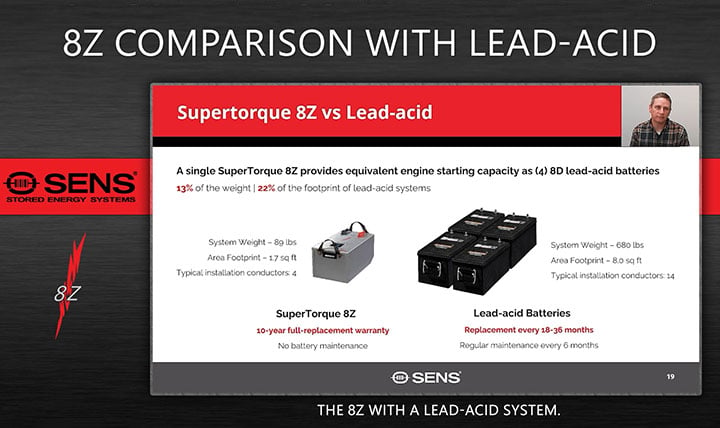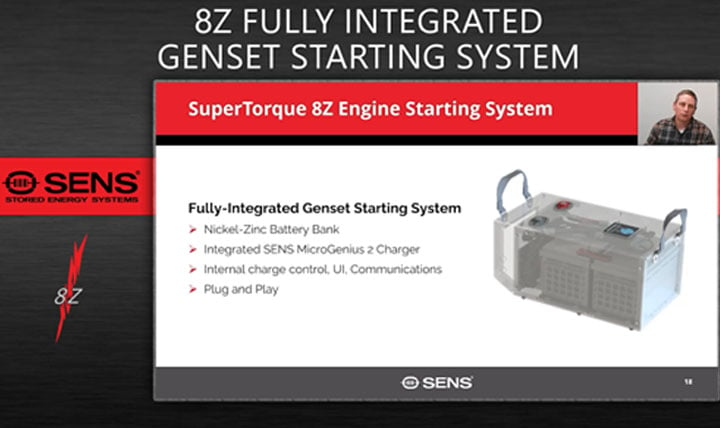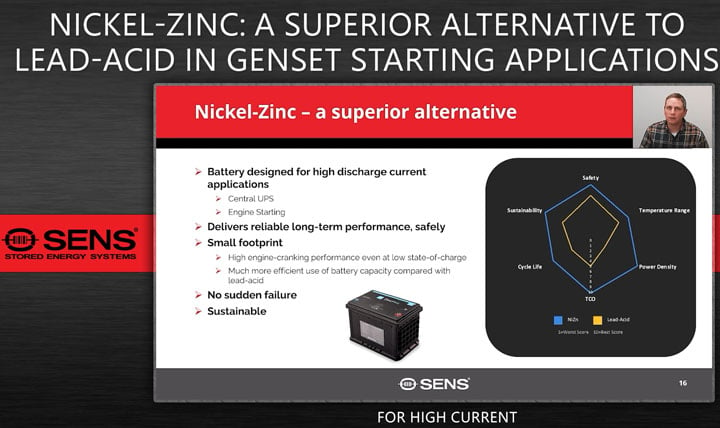EGSA Spring Conference
Las Vegas, NV
Event date: March 12-14, 2023
SENS presented two educational talks on Improving Genset Starting Applications
Bill Kaewert, CEO of SENS, and Eric Solyank, Genset Power Solutions Director, discussed the biggest problems currently plaguing the genset industry and current solutions attempting to remedy them.
Modernizing Genset Starting Systems
Bill Kaewert, CEO of SENS, highlights the current struggles with lead-acid batteries in genset starting applications.
Bill does a deep dive into existing solutions, including SENS' own SuperTorque 8Z integrated engine starting system featuring new nickel-zinc chemistry before taking Q&A.
Watch the talk and learn how to:
- Reduce the genset DC system footprint by 75%
- Improve battery life with a 10-year Standard Warranty
- Reduce or eliminate battery maintenance
- Increase genset reliability and safety
- Modernize critical power
watch clips to learn more about how the supertorque 8z is modernizing critical power
Solving the #1 Genset Problem: Starting Battery Failure
The most common cause of standby power system failures is weak or undercharged starting batteries.
Eric Solanyk, Genset Power Solutions Director at SENS, discusses the challenges faced when using lead-acid batteries in genset applications leading to weak or undercharged starting batteries:
- the short life of lead-acid batteries
- Operations and logistics challenges
- System specification
The talk also covers the currently viable alternatives to lead-acid batteries in genset starting systems such as:
- Nickel-cadmium
- Nickel-zinc
- Automated lead-acid conductance monitoring solves for monthly manual lead-acid conductance and specific gravity monitoring
- Integrated genset engine starting systems solve for DC system complexity
- Long-life and maintenance-free nickel-zinc batteries solve for required regular battery maintenance
- Super high-rate, compact, nickel-zinc batteries solve for frequent replacement of large and heavy lead-acid batteries.
what we learned at the event
Generator Reliability
This session will be a discussion of how to mitigate potential failures through maintenance in prospective of NFPA 110, Chapter 8. We will be covering testing and documentation, keeping your EPSS as reliable as possible, and owner/operator responsibilities.
Speaker: Jon Pinney ( Learning & Development Manager, Buckeye Power)
Optimizing Maintenance Intervals
With advancements in IoT (internet of things), AI (artificial intelligence), machine learning and sensor technologies, the connected industry is disrupting traditional fixed service interval approach by embracing Condition Based Maintenance. A sensor-based, data-driven approach can be applied to service practices enable real-time remote monitoring of filters and fluid health that helps end users to service engine consumables when needed and enable Condition Based Maintenance.
Speaker: Shantanu Nadgir (Global Business Development Manager, Cummins Filtration)
How Top Leaders Set the Tone for Recruitment & Retention
Regardless of what the economy is doing at any given time, some organizations always have a pipeline of the best candidates just waiting to come on board. More often than not, this is a result of those companies having a strong leadership culture that people want to be a part of. Not only does strong leadership attract great talent, it keeps that talent on the team and engaged! This session looks at why people join organizations, as well as why they leave, and provides key steps senior leaders can take to build this into all levels of their organization and have a direct impact on recruitment & retention.
Speakers: Wes & Cindy Dove (Founders, Dove Development)
The "Training Function": How to Increase Your Technicians Performance
In this session, discover the process for making measurable improvements in your technician’s performance by utilizing a training needs analysis. Learn how to investigate employee performance and identify which problems are training related and which are not. Utilize a training needs analysis process to properly assess the value of a training programs.
Speaker: Raymond Perrier (Prime Power) and Nathan Harris (EGSA)
/Hubspot%20800x600%20SuperTorque%208Z%20Zinc%20Angled.png?width=800&height=600&name=Hubspot%20800x600%20SuperTorque%208Z%20Zinc%20Angled.png)
![[MCP] Modernizing Critical Power Series Featured Image](https://www.sens-usa.com/hs-fs/hubfs/Visuals/Modernizing%20Critical%20Power%20Series/%5BMCP%5D%20Modernizing%20Critical%20Power%20Series%20Featured%20Image.png?width=800&height=400&name=%5BMCP%5D%20Modernizing%20Critical%20Power%20Series%20Featured%20Image.png)
Learn more about 5 common problems with lead-acid genset starting systems in our new monthly series, Modernizing Critical Power.



